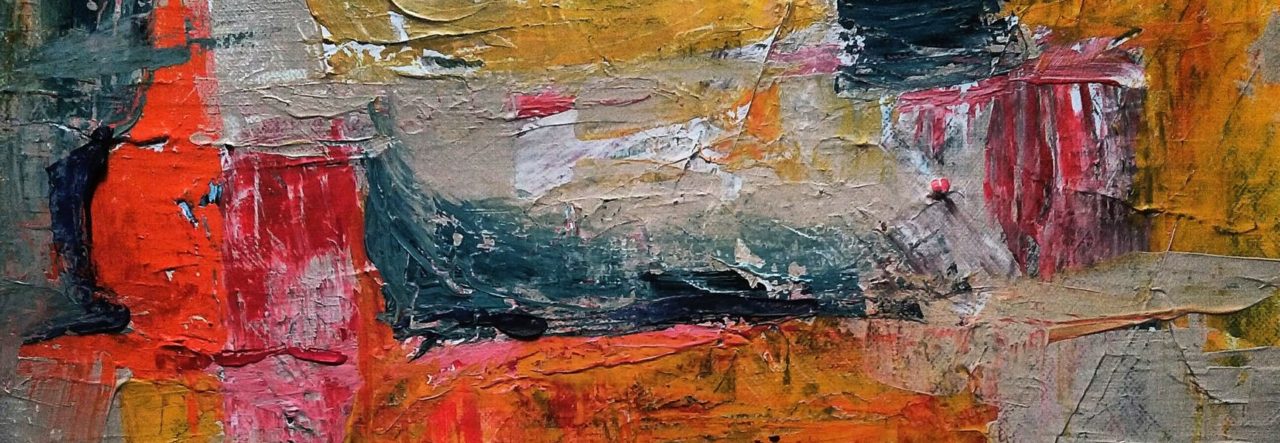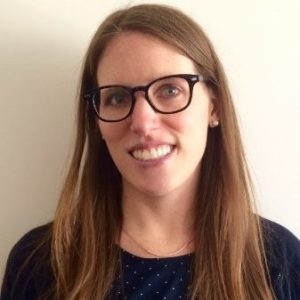 Welcome to Allison Cohen, who is the subject of this month’s Industry Insider interview at OPB. Since 2018, she’s been an editor at Running Press Kids (an imprint of Hachette Book Group), but for eight years prior to that, she served as a literary agent at The Gersh Agency. Before that, she worked almost two years as an assistant at a different literary agency (The Gernert Company).
Welcome to Allison Cohen, who is the subject of this month’s Industry Insider interview at OPB. Since 2018, she’s been an editor at Running Press Kids (an imprint of Hachette Book Group), but for eight years prior to that, she served as a literary agent at The Gersh Agency. Before that, she worked almost two years as an assistant at a different literary agency (The Gernert Company).
Allison got herself on my radar via being so prominent on the recent Dealmakers List at Publishers Marketplace—anyone making as many deals as she’s making has my attention for sure!
Allison keeps a pretty low online profile, so instead of me making things up or sharing summer internship information (for example, she worked at Gemstar/TV Guide for 5 months a long, long time ago), let’s jump ahead to the interview to see what we can discover together!
RVC: Congratulations on having the second-smallest digital footprint of anyone I’ve interviewed here. Is that on purpose or did it just happen that way?
AC: Hahaha! I wear that as a badge of honor. To be honest, I have a love-hate relationship with social media. I think it can be a wonderful place to connect and support a shared love of all things—books, music, food, travel, (insert personal interests here), but a few years ago, I realized I needed to take myself offline to protect my mental health. It can be a very toxic place, too, and so I’ve been happy to (mostly) let it go.
RVC: I hear you there! Other than my blog, I stay pretty low-key, as well. Now, let’s go back to the start of things for you. Where’d you grow up?
AC: Just outside northeast Philly.
RVC: Describe the path that led from there to where you are now, working in NYC as an editor for a kidlit imprint at one of the Big 5 publishers.
AC: I come from a long line of educators (both my parents were teachers, as was my sister, aunts/uncles, etc.), and so I always assumed I would be a high school English teacher when I grew up. In college, I realized my interests extended beyond teaching, and I thought about other opportunities I could pursue as an English Lit major. I thought about what I loved most (spoiler alert: books/reading), and had a moment where I was like, hmm…maybe I do the “teaching thing” later in life and find something in the immediate that lets me surround myself with books for a few years before I change gears. I didn’t really know where to start, so I applied to a job at TV Guide, hoping to work with their magazine (dating myself here). Let’s just say it wasn’t exactly what I’d imagined it would be.
Skip ahead to when an amazing friend of mine was telling me about her job in sales at Random House and how she thought I should consider moving to NYC and getting a job in “real” publishing. She sold me. My first job at a Big 5 was as the assistant to Madeline McIntosh when she led the audio group. She was an incredible mentor and really helped me figure out what I wanted to do. We were talking over lunch one day, and I started talking about all these editors I admired and how I wanted to be like them. She asked me what, specifically, I liked about what these editors did. After I told her, she casually asked if I’d ever thought about being an agent. I hadn’t. At the time, I thought of agents in the abstract. They were the people who sent publishers submissions, and then we took it from there. She set up some informal meetings for me to talk with agent friends she knew so I could hear more about their day-to-day, and I was hooked. I wanted to be the person on the very front lines. Finding the author, helping them shape their work, finding them a home with a publisher, championing them every step of the way, having these lifelong connections.
So, when the opportunity presented itself, I took a job as an assistant to two agents. I learned a lot about what really goes into creating a book—what it takes to find and grow authors, sell books, etc. I eventually wound up as Phyllis Wender’s assistant at Gersh. I’ve never met anyone like Phyllis. Her career path is incredible. There’s nothing she hasn’t done. She is also one of the most passionate, dedicated, generous, loving people I’ve ever met. To this day, she is an unbelievable mentor. She helped me build my list and become an agent in my own right. I am forever indebted to her and could write a book about all she’s taught me—personally and professionally. After eight years at Gersh, however, an opportunity presented itself and…well, RP Kids became my home!
RVC: All the time, I see editors moving into the field of agenting. You did that, but then you boomeranged back to editing. That’s really quite rare.
AC: I loved being an agent. I loved working with writers across genres—children’s and adult, fiction and non-fiction, etc. And the relationships I built with my authors were unbelievably special. But the 24⁄7 hustle was a lot. You’re not just an agent—you’re an editor, an accountant, a lawyer, a therapist, etc. I often found myself pulled away from some of what I loved best about the job—working with authors on developing their manuscripts. Don’t get me wrong, being an editor requires hustle—nights and weekends reading and editing—but it’s a different kind. I had been talking to an editor friend of mine about life and maybe making a change but not really knowing what that change was.
That same week, I saw the opening at Running Press Kids. It felt like the universe was sending me a sign. I REALLY struggled with leaving behind my authors, but I knew the relationships with the ones who really mattered would continue (they have), and I told myself that if the whole editing “thing” didn’t work out, I could always come back to agenting. I knew how to do it. I loved it. I could come back.
I started at Running Press and I loved it. Present tense. I love it. I love the people. The entire team—we’re a family. I love our authors. I love our list. It’s relit a creative fire I didn’t realize I’d been missing. Four years later, I can’t imagine doing anything else.
RVC: For those that don’t know Running Press Kids that well, say a few words about what makes it different than other imprints and presses.
AC: We are small but mighty. And we approach every book as a collaboration. We trust each other and really value opinions on everything from cover to copy. And I think the collective passion of our team is why our books look the way they do and find the readers they do. Because we’re all working towards the same goal of instilling a lifelong love of reading into the readers who find our books.
RVC: What was the first picture book you acquired?
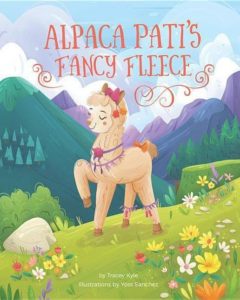 AC: Alpaca Pati’s Fancy Fleece by Tracey Kyle.
AC: Alpaca Pati’s Fancy Fleece by Tracey Kyle.
RVC: What was the best lesson that came out of that book?
AC: It was a crash course in how to manage all the moving parts of producing a picture book. From finding an illustrator to managing schedules of deliverables. I learned just how collaborative the process is—not just between the author and illustrator, but across all the different departments—editorial, design, managing ed, production, marketing/publicity, sales. There is SO much that goes into making these books happen. They don’t just appear on shelves at stores. Ha!
RVC: It seems like you have a particular interest in nonfiction picture books. Is that fair?
AC: Ooh, I don’t know…maybe in the beginning? I love books that teach kids about the world without being overly didactic. At RPK, we pride ourselves on publishing beautiful books that educate while they entertain. That said, several of my more recent acquisitions have been fiction, and it’s because I need that balance. Fiction offers opportunities to celebrate life and nature and can teach kids how to be better people, all through the power of story.
RVC: Let’s help out those writers and agents who read OPB. What kinds of things are you looking for?
AC: Hmm…this is hard because sometimes I don’t realize I’m looking for something until it hits my desk. That is such a non-answer, I know. I will say that I have been having a lot of fun with our mystical/magical books. With picture books I take on, I’m mostly looking for projects in the mindfulness, conservation/nature, and social justice space.
RVC: What kinds of things are you NOT looking for?
AC: Rhyming picture books! Okay, to be fair, there is always an exception to this. BUT it often seems writers think picture books have to be written in rhyme, and then they try to force this rhyme scheme that doesn’t feel natural and the book falls apart a little.
On a more general note, I’m not looking for sci-fi/fantasy or chapter books.
RVC: I’m curious about what you do in a day-to-day work sense.
AC: Day-to-day…it really depends on what kinds of meetings we have. First thing, every morning, I check my email to make sure there aren’t any “fires” that developed overnight. Then I look at the day and block out times to deal with all the things. I used to try and get to every email in real-time, but it’s a losing battle. So, now I just create blocks on the calendar to tend to everything. I work on pitches/proposals for our internal editorial meetings (including comp research). I run P&Ls for potential acquisitions. I review passes and proofs of our books in production, style manuscripts for transmittal, work on cover copy, draft fact sheets for sales/marketing. This all happens in between various meetings—cover meetings (love reviewing covers of our books), illustrator meetings (reviewing portfolios for potential projects), editorial meetings, calls with agents, editorial calls with authors, etc.
Mind you, I try to check my email every half hour or hour, depending on what the day is like. The hardest part, honestly, is just trying to keep things moving and being able to pivot when something major needs to be addressed.
RVC: What’s the most common misconception that people have about editors?
AC: That we spend our days reading and editing manuscripts. If only! The days are spent drafting copy, running P&Ls, reviewing proofs, preparing titles for launch and sales conference. Pretending I don’t have 221 emails in my inbox…(see above answer—hahaha!)
RVC: If you had to summarize the most important thing you’ve learned about being an editor, what would it be?
AC: To be flexible. Sometimes, you have to reimagine a book—sometimes it’s the trim size or page count. Sometimes it’s the art because an illustrator you wanted isn’t available. Sometimes a book’s on-sale date has to move out—it can be a month or two, or sometimes it’s to a different season. There are a multitude of reasons things change over the course of a book’s production, and much is out of your control, so you just have to roll with it. Remind yourself it’s all part of the process of making sure the book is the best version of itself.
RVC: What’s one thing that a lot of people just don’t quite understand about picture books?
AC: There is SO much that has to come together to make a book. That’s why schedules can be so long. It takes a lot to create synergy between the text and illustrations—you have the manuscript, then you find the right illustrator, then you get the sketches (almost always adjustments are made), then you see the color art (more adjustments are made). You’re getting together materials to share with sales so they can sell in to their accounts. You’re building marketing/publicity plans to launch the book into the world. All this is happening while the managing ed and production teams are doing their best to make sure the books are printed, shipped, etc. There are so many hands that touch a book. It takes time. It’s a lot of work, but then you get the advance copy, hold it in your hands and think, THIS IS WHY. It is incredible when everything works out.
RVC: Since COVID has clearly affected all of us, I’m making an extra effort to ask a mental health question in every interview now. Here’s yours: what do you do to de-stress?
AC: I go outside. I feel so much better surrounded by nature. I go for runs or hikes. I just need to get out and get moving.
RVC: And here’s a follow-up mental health question. What do you do to defeat negativity—internally or from the outside world?
AC: That’s a great question. It’s something I’m really working on, so I’m not sure I have an answer. I will say I have some really amazing friends and family that are always at the ready to offer support and keep me in check. So, when I’m really feeling down about something, I just reach out to the people I love and know they will come back with either a virtual hug or send a ridiculous meme to distract me.
Sounds cheesy, but it’s the best I can think of for now.
RVC: One last question for this part of the interview. What forthcoming projects do you want to brag about?
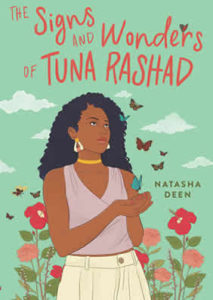 AC: There are so many!! Honestly, I look at our list and just think, WOW, we make beautiful books that demand conversation (and attention). Natasha Deen was the very first author I worked with at RP Kids, and her next book with us, The Signs and Wonders of Tuna Rashad (YA fiction) pubs this summer. The second book from Lil Miss Hot Mess, If You’re a Drag Queen and You Know It, comes out this summer. I didn’t work on this, but it’s just such a fun book, and the cover is incredible—a true feast for the eyes!
AC: There are so many!! Honestly, I look at our list and just think, WOW, we make beautiful books that demand conversation (and attention). Natasha Deen was the very first author I worked with at RP Kids, and her next book with us, The Signs and Wonders of Tuna Rashad (YA fiction) pubs this summer. The second book from Lil Miss Hot Mess, If You’re a Drag Queen and You Know It, comes out this summer. I didn’t work on this, but it’s just such a fun book, and the cover is incredible—a true feast for the eyes!
We have an awesome Junior Handbook series, and the third book is publishing 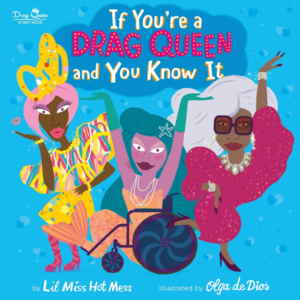 this Fall—The Junior Tarot Reader’s Handbook. In a similar “mystical” vein, we have Astrology for Black Girls this summer. We have two picture books that reteam the author/illustrator, that are so much fun—Peculiar Primates and Battle of the Brains coming this Fall.
this Fall—The Junior Tarot Reader’s Handbook. In a similar “mystical” vein, we have Astrology for Black Girls this summer. We have two picture books that reteam the author/illustrator, that are so much fun—Peculiar Primates and Battle of the Brains coming this Fall.
I could seriously go on and on. Is there room to brag about all of our books? Because that’s how I feel about our list.
RVC: Alrighty, Allison. It’s time for the Big Moment. It’s…THE LIGHTNING ROUND! The point values are quintupled, and the stakes have never been higher. We’ve got the countdown clock ready because we’re looking to handle six questions and answers in sixty seconds. Are you ready?
AC: [Stretches arms. Closes eyes and takes a deep breath…]
RVC: If you could only have one app on your phone, it’d be…
AC: My music app. I LOVE music and have all sorts of playlists depending on my mood or what I’m doing—editing, running, cooking, etc. Wait, is that considered an app? If not, then I guess my Notes app because I use it all the time when I have an idea for a book or need to create lists or to-dos. My brain is so overloaded that I can’t remember anything without writing it down.
RVC: Would you rather have a personal chef, a personal trainer, or a maid?
AC: Ryan! Oh, gosh…ummm…personal chef? I actually find cleaning therapeutic. I do like cooking, but I don’t always have the time or resources. But, man, a personal trainer would be pretty cool, too.
Chef. I’m going to stick with personal chef! Final answer!
RVC: If someone narrated your life, who would you want to be the narrator?
AC: Jennifer Garner. She’s the first person that popped into my head. I don’t know why. Maybe because she’s amazing?
RVC: Five words (or fewer!) that come to mind when someone says “Art Notes.”
AC: Leave room for creative license! (to be clear, for the illustrator’s creative license)
RVC: What was the One That Got Away?
AC: Oof. You would think it would get easier each time, but there are a few that have stuck with me even years later. I try to console myself with the knowledge that at least the book will find its way into the hands of readers, and I’ll be able to add a copy to my personal bookshelf.
RVC: Your favorite quote about picture books (or writing, or editing—I can adjust to whatever you’ve got)
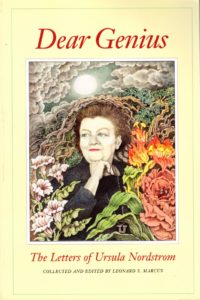 AC: It’s not a quote, but I was gifted the book Dear Genius: The Letters of Ursula Nordstrom, and it is one of the best gifts I’ve ever been given. I changed a lot about the way I approach editing after reading her letters. And I think anyone who loves publishing and books should read it. There is so much wonderful history (and humanity) in this book, and I have found a lot of inspiration in how I approach my work from it. If you really need a quote, though, on my wall is a quote from Ernest Hemingway: There is no friend as loyal as a book. 😉
AC: It’s not a quote, but I was gifted the book Dear Genius: The Letters of Ursula Nordstrom, and it is one of the best gifts I’ve ever been given. I changed a lot about the way I approach editing after reading her letters. And I think anyone who loves publishing and books should read it. There is so much wonderful history (and humanity) in this book, and I have found a lot of inspiration in how I approach my work from it. If you really need a quote, though, on my wall is a quote from Ernest Hemingway: There is no friend as loyal as a book. 😉
RVC: Thanks so much, Allison!
AC: THANK YOU!!!

